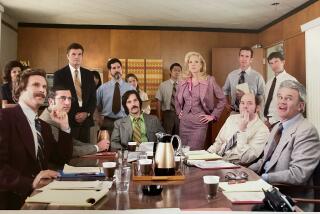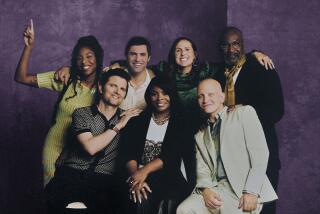‘The Other Guys’
There is something so richly subversive, so vicariously appealing about turning accountants into action heroes who aim their big guns at Wall Street Ponzi schemers that the idea alone makes the new buddy-cop comedy, “The Other Guys,” clever and funny from the first frame.
Fortunately, many other clever and funny frames follow. Which is nice to be able to say about a Will Ferrell comedy again after a recent string of duds capped (hopefully tighter than a BP oil well) by the dismal “Land of the Lost” in 2009.
This latest gambit stars Ferrell as Det. Allen Gamble, a NYPD forensic accountant, and Mark Wahlberg as his rogue cop partner, a reluctant and raging Terry Hoitz. These flat-footed flatfoots get lots of razzing from the other boys in blue, but in typical don’t-count-Ferrell’s-underachievers-out fashion, they just might derail a $32-billion stock market rip-off if they can follow the paper trail and stop bickering long enough to figure it out.
The film is directed by the actor’s long-time comic co-conspirator, Adam McKay (they did, among others, 2006’s “Talladega Nights: The Ballad of Ricky Bobby,” one of the best Ferrell funnies). McKay shares writing credit with Chris Henchy, another longtime compadre and one of the responsible parties for said bad “Land of the Lost.” But here the filmmakers are in fine fettle, which goes a long way to make much of the low-brow silliness and slapstick infectious.
The plot doesn’t always hold water and it has a tendency to ramble, but they don’t seem to care. And honestly, neither should you. The film has enough hard-core action and truly funny bits to keep boredom at bay, starting with the incident that has left Hoitz in disgrace: He’s the Jeter shooter, as in he clipped beloved Yankees superstar Derek Jeter by mistake, basically a hanging crime in the Big Apple.
The department’s resident superstars are detectives Danson and Highsmith, played by Dwayne “We Can’t Call Him The Rock Anymore” Johnson and Samuel L. Jackson, respectively (and respectfully). They are responsible for the crushing, metal-twisting, rubber-burning, street-screeching end to about a thousand cars. The duo blaze their way through the city fighting crime and losing criminals before jumping off the top of a skyscraper after yet another bad guy gets away in either a nod to Butch Cassidy and the Sundance Kid’s famous escape or a handy device to get them out of the way so a new pair of heroes can step in.
Even so, a computer nerd and a Jeter shooter aren’t exactly the top candidates to fill those shoes. It’s all Terry can do to get Allen out of one humiliation after another, though recovering from the “desk-pop” incident is no walk in the park (Allen is tricked into firing his gun in the office; punishment is carrying a wooden replica of a revolver for a while). Terry, a strangely manic Wahlberg, finally resorts to kidnapping his partner at gunpoint to get him out of the office.
Ferrell’s gangly body, nerdy looks and carefully cultivated loser-ness all work to make his CPA cop a likely candidate to join the comic’s list of indelible characters. He does look unable to handle a gun. He does look like he would pick a Prius to drive. But he doesn’t look like he would have a hot ER doctor for a wife in Eva Mendes, who seems to be the well-endowed, well-displayed body of choice these days.
Ultimately though, it is a world where shortcomings are assets and since Allen has the most, he’s the sun around which all “The Other Guys’ ” other guys orbit. There is a lot of spinning going on including: pension fund fraud; car chases; college girl pimping; shootouts; unruly bums who do unspeakable things in cars; a Wall Street con artist (Steve Coogan) who does unspeakable things with cash; more shootouts, more car chases. I could mention the trouble in Allen’s marriage; Terry’s issues with his ex, anger and ballet; and that all the bawdy blue language more than earns the PG-13 rating, but you’d probably just get impatient.
What makes it all more interesting, and much smarter, than the above litany of high jinks and scoundrels might suggest, is that there really is a message (possibly even a method) in all of McKay and Henchy’s screenwriting madness. If you haven’t caught on from all the jokes along the way, they hit it again, turning the final credits into a “big guys” versus the “other guys” running gag list of the many financial indiscretions we’ve collectively suffered at the hands of the Bernie Madoffs and AIGs of the world; a veritable catalog of all the Enrons and the end-runs.
Which if you think of it is as both a sight gag and a sad gag; even a gag-able gag. But then “The Other Guys” doesn’t actually want you thinking too hard. Now laughing? Well that’s another matter.
More to Read
Only good movies
Get the Indie Focus newsletter, Mark Olsen's weekly guide to the world of cinema.
You may occasionally receive promotional content from the Los Angeles Times.









